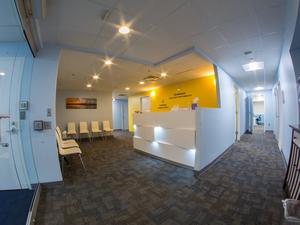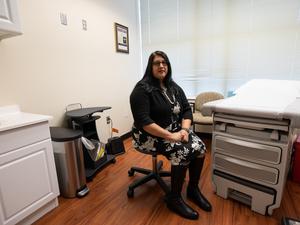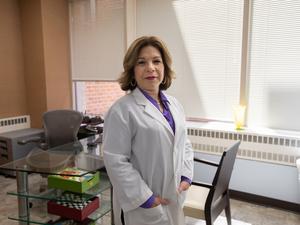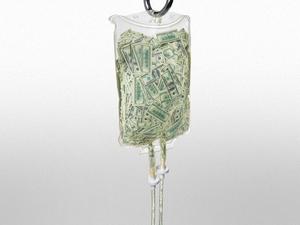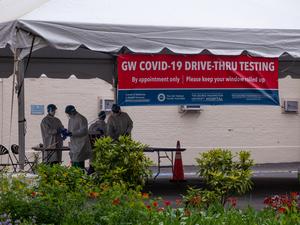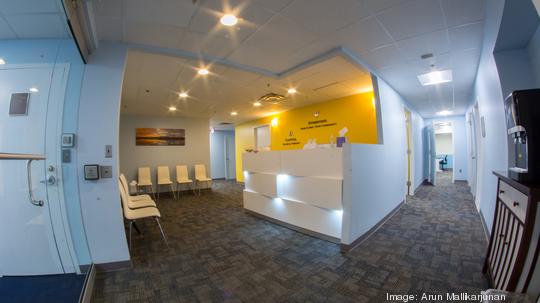
Husband-wife business partners started a company that helps take the act of operating private practices off of a health care practitioner's plate. Today, they say an escalating demand has them out working to raise more money and expand their own operation.
Their startup, Symbiosis LLC, rents space at its D.C. headquarters, spanning 3,314 square feet at 1331 H St. NW, to doctors and other health care providers and helps them to start up or expand their practices. The client clinicians pay for services from scheduling to insurance, and the Symbiosis team handles their operations through contracts that range anywhere from $500 to $5,000 per month.
Since its 2017 launch, it’s added 10 tenants, including independent doctors, therapists and nurse practitioners, giving patients “a wide variety of complementary care providers” in one place, said co-founder and CEO Arun Mallikarjunan. His wife, Symbiosis co-founder Subha Nagasubramanian, also runs her own physical therapy practice, Capitol Physical Therapy, out of the company’s H Street space.

Now it’s building its own practice management platform to cater to different types of clinicians and providers, including software for everything from patient intake to treatment to billing to follow-up care. That will use a task-based model, so everyone from the doctor’s offices to Symbiosis knows what needs to get done and who needs to do it, Mallikarjunan said.
“If we don’t do this, then we also have to find individual software platforms that work for each of these providers” and pay for each of those, he said. “But if we provide that service in-house, I can then provide the economies of cost savings, because I’m providing the service also.”
The goal is eventually to market that platform to more users outside of its D.C. walls, Mallikarjunan said. That software, the co-founders said, could perhaps grow to be its own company, providing a bigger return on investment than the Symbiosis brick-and-mortar site.
“The software platform is going to be the glue that makes us faster,” Mallikarjunan said, adding that the company is hardly abandoning its physical footprint either. “The brand will be much more cohesive if it has Symbiosis locations attached to it.”
In that vein, the owners are planning a second location, either in Northern Virginia or the District, expecting to identify a site and nail down specifics soon. They’re also looking to temporarily expand to another floor in their existing building, to quickly accommodate demand at that site that they said they currently cannot meet.

All of this is why Symbiosis is raising new funding. The company opened a $750,000 raise this September, after holding off in March as the pandemic hit. And that could precede another raise within the next 18 to 24 months. With the first round of capital, the company will hire more people: a software development team, sales and marketing employees, management staff for the second location and a chief financial officer. In total, the operation could bring on another nine people, nearly doubling the size of the 10-person team, Mallikarjunan said.
Up to this point, the co-founders have completely bootstrapped the business with $300,000 in personal investment. And it’s been self-sustaining since the end of 2019. For 2021, Symbiosis projects to grow revenue 20% to 30%, Mallikarjunan said, declining to disclose specifics.
As entrepreneurs themselves, Mallikarjunan and Nagasubramanian want to support doctors’ entrepreneurial journeys — skills required to build up a practices, but not taught necessarily taught in medical school, for instance. Functioning as a sole practitioner these days, in an increasingly consolidating industry, is a challenge in itself; more self-employed doctors are affiliating with larger health systems and securing backing by venture capitalists and others. During the pandemic, the hurdles have only grown — and Symbiosis is looking to serve those providers.
“The vision for the company is essentially to be a catalyst for all of these folks who want to start their own practice,” Mallikarjunan said, “and also for folks who are winding down, toward end of their career, and don’t want to be managing their own offices but still want to treat their patients.”
